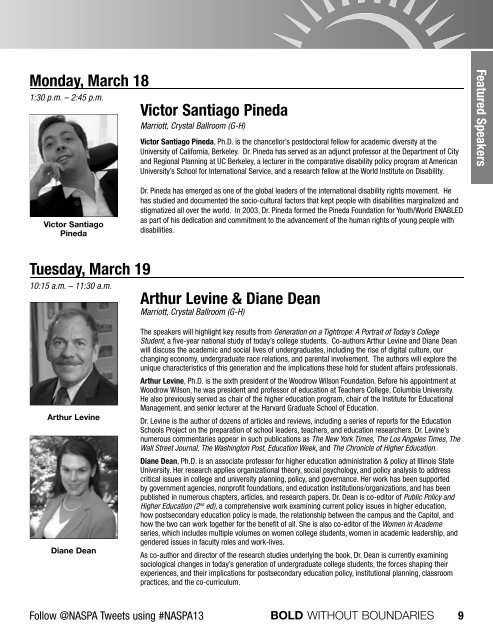BR8ORnsG
BR8ORnsG
BR8ORnsG
Create successful ePaper yourself
Turn your PDF publications into a flip-book with our unique Google optimized e-Paper software.
Monday, March 18<br />
1:30 p.m. – 2:45 p.m.<br />
Victor Santiago Pineda<br />
Marriott, Crystal Ballroom (G-H)<br />
Victor Santiago<br />
Pineda<br />
Follow @NASPA Tweets using #NASPA13<br />
Victor Santiago Pineda, Ph.D. is the chancellor’s postdoctoral fellow for academic diversity at the<br />
University of California, Berkeley. Dr. Pineda has served as an adjunct professor at the Department of City<br />
and Regional Planning at UC Berkeley, a lecturer in the comparative disability policy program at American<br />
University’s School for International Service, and a research fellow at the World Institute on Disability.<br />
Dr. Pineda has emerged as one of the global leaders of the international disability rights movement. He<br />
has studied and documented the socio-cultural factors that kept people with disabilities marginalized and<br />
stigmatized all over the world. In 2003, Dr. Pineda formed the Pineda Foundation for Youth/World ENABLED<br />
as part of his dedication and commitment to the advancement of the human rights of young people with<br />
disabilities.<br />
Tuesday, March 19<br />
10:15 a.m. – 11:30 a.m.<br />
Arthur Levine & Diane Dean<br />
Marriott, Crystal Ballroom (G-H)<br />
Arthur Levine<br />
Diane Dean<br />
The speakers will highlight key results from Generation on a Tightrope: A Portrait of Today’s College<br />
Student, a fi ve-year national study of today’s college students. Co-authors Arthur Levine and Diane Dean<br />
will discuss the academic and social lives of undergraduates, including the rise of digital culture, our<br />
changing economy, undergraduate race relations, and parental involvement. The authors will explore the<br />
unique characteristics of this generation and the implications these hold for student affairs professionals.<br />
Arthur Levine, Ph.D. is the sixth president of the Woodrow Wilson Foundation. Before his appointment at<br />
Woodrow Wilson, he was president and professor of education at Teachers College, Columbia University.<br />
He also previously served as chair of the higher education program, chair of the Institute for Educational<br />
Management, and senior lecturer at the Harvard Graduate School of Education.<br />
Dr. Levine is the author of dozens of articles and reviews, including a series of reports for the Education<br />
Schools Project on the preparation of school leaders, teachers, and education researchers. Dr. Levine’s<br />
numerous commentaries appear in such publications as The New York Times, The Los Angeles Times, The<br />
Wall Street Journal, The Washington Post, Education Week, and The Chronicle of Higher Education.<br />
Diane Dean, Ph.D. is an associate professor for higher education administration & policy at Illinois State<br />
University. Her research applies organizational theory, social psychology, and policy analysis to address<br />
critical issues in college and university planning, policy, and governance. Her work has been supported<br />
by government agencies, nonprofi t foundations, and education institutions/organizations, and has been<br />
published in numerous chapters, articles, and research papers. Dr. Dean is co-editor of Public Policy and<br />
Higher Education (2nd ed), a comprehensive work examining current policy issues in higher education,<br />
how postsecondary education policy is made, the relationship between the campus and the Capitol, and<br />
how the two can work together for the benefi t of all. She is also co-editor of the Women in Academe<br />
series, which includes multiple volumes on women college students, women in academic leadership, and<br />
gendered issues in faculty roles and work-lives.<br />
As co-author and director of the research studies underlying the book, Dr. Dean is currently examining<br />
sociological changes in today’s generation of undergraduate college students, the forces shaping their<br />
experiences, and their implications for postsecondary education policy, institutional planning, classroom<br />
practices, and the co-curriculum.<br />
BOLD WITHOUT BOUNDARIES<br />
9<br />
Featured Speakers


